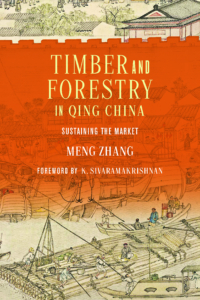ZHANG Meng 张萌
Biography
ZHANG (“jong”) is the surname and Meng (“mong”) is the given name.
I am a historian of late imperial and modern China, and my scholarship focuses on issues of economic and environmental transformation, the political economy of empire, and transregional connections in the rise of global capitalism. I approach the study of economic life in the human past from both the top down and the bottom up to reveal the often-unexpected interplay between grand changes in national policies, international relations, and global market and locally contextualized choices and practices by individuals, households, enterprises, and grass-roots organizations. My research has been supported by the National Endowment for the Humanities, the Luce/ACLS program in China Studies, the Andrew W. Mellon Foundation, the Institute for Advanced Study, and the Association for Asian Studies.
My first book, Timber and Forestry in Qing China: Sustaining the Market (University of Washington Press, 2021), reveals the complex reality of timber trade and resource management during the flurry of commercial development in Qing China (1644-1911). It has won the Charles A. Weyerhaeuser Book Award (2022) of the Forest History Society for the best book published on forest and conservation history as well as the honorable mention for the Biennial Book Prize (2021-2022) of the International Society for Chinese Law and History. Pushing against the standard depiction of this era as one of reckless deforestation, this book demonstrates how contractual innovations and market institutions emerged to develop renewable timber resources as old-growth forests were cut down. Listen to a New Books Network podcast interview about this book here or watch a recorded book talk here and here.


My current project, All the Debt Under Heaven, examines the dynamics between commercial credit and the Qing imperial formation by investigating cross-cultural/inter-ethnic loans at multiple frontiers of the Qing empire, bridging the divides in the scholarship among the Sino-Western, maritime Asian, and Central Asian focuses. It centers on Qing conceptions of sovereignty and liability in the long eighteenth century that undergirded a different logic of imperial construction than that of European empires.
I am also writing about the social life of edible bird’s nests — made from the hardened saliva of a rare species of cave-nesting swiftlets in Southeast Asia and extolled by elite Chinese consumers as a delicacy and medical elixir. This project examines the knowledge-making, circulation, and consumption of edible birds’ nests during the 16th to the 19th centuries. It engages with transnational dynamics of value creation and accumulation as well as long-term interactions between human institutions and the environment.
Together with history department colleagues, I’m co-organizing the History Brown Bag Seminar Series (Follow our X @UCLAHist_BBag). Get in touch if you are in the area and would like to workshop a paper!
Field of Study
Late Imperial and Modern China, Social and Economic History, Political Economy and Ecology, Comparative Empire, Global History of Capitalism
Publications
Book
Timber and Forestry in Qing China: Sustaining the Market (Seattle: University of Washington Press, 2021).
- Chinese translation by Shi Kejian 史可鉴, Liudong de senlin: yibu Qingdai shichang jingji shi 流动的森林: 一部清代市场经济史 (Shanghai: Guangqi Shuju, 2024).
Articles and Chapters
Meng Zhang, “Knowing Exotica: Edible Bird’s Nest and the Cultures of Knowledge in Early Modern China,” Harvard Journal of Asiatic Studies 85, no. 1 (June 2025): 39–76, 10.1353/jas.2025.a966205.
“Empire of Impartiality: Managing Indebtedness to Foreigners in Eighteenth-Century China,” Journal of Global History 19, no. 3 (November 2024): 323–43, https://doi.org/10.1017/S1740022823000311.
“Frontier Timber in Southwest China: Market, Empire, and Identity,” in The Cultivated Forest: People and Woodlands in Asian History, ed. Ian Matthew Miller et al. (Seattle: University of Washington Press, 2022), 77–94.
“Financing Market-Oriented Reforestation: Securitization of Timberlands and Shareholding Practices in Southwest China, 1750-1900.” Late Imperial China 38, no. 2 (2017), pp. 109–51, 10.1353/late.2017.0006.
“Timber Trade Organizations in Shanghai: Institutions, Enforcement, and Dispute Resolution, 1880-1930.” International Journal of Asian Studies 14, no. 2 (2017), pp. 143–70, 10.1017/S1479591417000043.
Awards & Grants
2024-25 Luce/ACLS Early Career Fellowship in China Studies (Flexible)
2023 National Endowment for the Humanities Summer Stipend
2022 Charles A. Weyerhaeuser Book Award of the Forest History Society
2022 Honorable mention, Biennial Book Prize (2022) of the International Society for Chinese Law and History
2021-23 Britton-Perry Dean’s Faculty Fellow, College of Arts and Science, Vanderbilt University
2021 Andrew W. Mellon Foundation Fellowship for Assistant Professors, Institute for Advanced Study
2020 Association of Asian Studies First Book Subvention Fund
Graduate Students
Professor Zhang welcomes graduate applications from students working on the history of early modern/modern China from the angles of economic and financial history, borderland and ethnicity, environmental history, empire/state building, material culture, and oceanic history. She also co-supervises or serves on the committee for dissertations on the same themes that take a transnational/comparative scope or focus on other regions and periods.
Find out more about the PhD program in the China field here.


